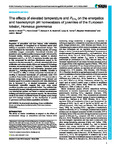The effects of elevated temperature and PCO2 on the energetics and haemolymph pH homeostasis of juveniles of the European lobster, Homarus gammarus
| dc.contributor.author | Small, DP | |
| dc.contributor.author | Calosi, P | |
| dc.contributor.author | Rastrick, SPS | |
| dc.contributor.author | Turner, Lucy | |
| dc.contributor.author | Widdicombe, S | |
| dc.contributor.author | Spicer, John | |
| dc.date.accessioned | 2020-07-09T19:51:25Z | |
| dc.date.issued | 2020-04-16 | |
| dc.identifier.issn | 0022-0949 | |
| dc.identifier.issn | 1477-9145 | |
| dc.identifier.other | ARTN jeb209221 | |
| dc.identifier.uri | http://hdl.handle.net/10026.1/15965 | |
| dc.description.abstract |
<jats:title>ABSTRACT</jats:title> <jats:p>Regulation of extracellular acid–base balance, while maintaining energy metabolism, is recognised as an important aspect when defining an organism's sensitivity to environmental changes. This study investigated the haemolymph buffering capacity and energy metabolism (oxygen consumption, haemolymph [l-lactate] and [protein]) in early benthic juveniles (carapace length &lt;40 mm) of the European lobster, Homarus gammarus, exposed to elevated temperature and PCO2. At 13°C, H. gammarus juveniles were able to fully compensate for acid–base disturbances caused by the exposure to elevated seawater PCO2 at levels associated with ocean acidification and carbon dioxide capture and storage (CCS) leakage scenarios, via haemolymph [HCO3−] regulation. However, metabolic rate remained constant and food consumption decreased under elevated PCO2, indicating reduced energy availability. Juveniles at 17°C showed no ability to actively compensate haemolymph pH, resulting in decreased haemolymph pH particularly under CCS conditions. Early benthic juvenile lobsters at 17°C were not able to increase energy intake to offset increased energy demand and therefore appear to be unable to respond to acid–base disturbances due to increased PCO2 at elevated temperature. Analysis of haemolymph metabolites suggests that, even under control conditions, juveniles were energetically limited. They exhibited high haemolymph [l-lactate], indicating recourse to anaerobic metabolism. Low haemolymph [protein] was linked to minimal non-bicarbonate buffering and reduced oxygen transport capacity. We discuss these results in the context of potential impacts of ongoing ocean change and CCS leakage scenarios on the development of juvenile H. gammarus and future lobster populations and stocks.</jats:p> | |
| dc.format.extent | jeb209221-jeb209221 | |
| dc.format.medium | Electronic | |
| dc.language | en | |
| dc.language.iso | en | |
| dc.publisher | The Company of Biologists | |
| dc.subject | Developmental physiology | |
| dc.subject | Ocean acidification | |
| dc.subject | Ocean warming | |
| dc.subject | Early benthic juvenile | |
| dc.subject | Acid-base balance | |
| dc.subject | Metabolism | |
| dc.title | The effects of elevated temperature and PCO2 on the energetics and haemolymph pH homeostasis of juveniles of the European lobster, Homarus gammarus | |
| dc.type | journal-article | |
| dc.type | Journal Article | |
| dc.type | Research Support, Non-U.S. Gov't | |
| plymouth.author-url | https://www.webofscience.com/api/gateway?GWVersion=2&SrcApp=PARTNER_APP&SrcAuth=LinksAMR&KeyUT=WOS:000541835800003&DestLinkType=FullRecord&DestApp=ALL_WOS&UsrCustomerID=11bb513d99f797142bcfeffcc58ea008 | |
| plymouth.issue | 8 | |
| plymouth.volume | 223 | |
| plymouth.publication-status | Published | |
| plymouth.journal | The Journal of Experimental Biology | |
| dc.identifier.doi | 10.1242/jeb.209221 | |
| plymouth.organisational-group | /Plymouth | |
| plymouth.organisational-group | /Plymouth/Faculty of Science and Engineering | |
| plymouth.organisational-group | /Plymouth/Faculty of Science and Engineering/School of Biological and Marine Sciences | |
| plymouth.organisational-group | /Plymouth/REF 2021 Researchers by UoA | |
| plymouth.organisational-group | /Plymouth/REF 2021 Researchers by UoA/UoA07 Earth Systems and Environmental Sciences | |
| plymouth.organisational-group | /Plymouth/Research Groups | |
| plymouth.organisational-group | /Plymouth/Research Groups/Marine Institute | |
| plymouth.organisational-group | /Plymouth/Users by role | |
| plymouth.organisational-group | /Plymouth/Users by role/Academics | |
| dc.publisher.place | England | |
| dcterms.dateAccepted | 2020-03-01 | |
| dc.rights.embargodate | 2021-4-16 | |
| dc.identifier.eissn | 1477-9145 | |
| dc.rights.embargoperiod | Not known | |
| rioxxterms.funder | Natural Environment Research Council | |
| rioxxterms.identifier.project | Impacts of ocean acidification on key benthic ecosystems, communities, habitats, species and life cycles | |
| rioxxterms.versionofrecord | 10.1242/jeb.209221 | |
| rioxxterms.licenseref.uri | http://www.rioxx.net/licenses/all-rights-reserved | |
| rioxxterms.licenseref.startdate | 2020-04-16 | |
| rioxxterms.type | Journal Article/Review | |
| plymouth.funder | Impacts of ocean acidification on key benthic ecosystems, communities, habitats, species and life cycles::Natural Environment Research Council |


